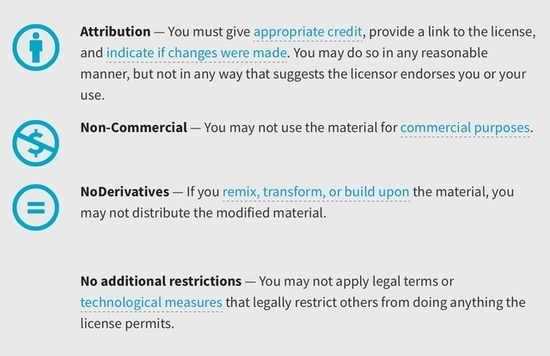Can I use it?

Inspired by Elisha.
If, while walking down the mall, you see a person sitting on a garden wall and beside them on that wall you noticed a loaf of bread you wouldn’t just pick up the bread and walk off assuming it was free would you? No, of course not, you would assume that the bread belongs to that person. You could certainly ask the person if it’s free to take and use it or if it’s for sale and that is exactly the way it is with the Internet. Only the loaf of bread is a photo, a picture, a song or an article or some other item.
Some people may not realise that just because it is on the Internet does not mean it is there for the taking. It does not mean it is free or if it is free it does not necessarily mean it comes without legal conditions of use. Even some things you pay for, such as stock images, can come with conditions of use.
Some may even argue that because it is on the Internet it is in the public domain. The public domain is “the state of belonging or being available to the public as a whole, especially through not being subject to copyright or other legal restrictions.”[1] With regards to copyright law the term “public domain” actually means “belonging to the public” rather than “available to the public.” So therefore a work may be available to the public without belonging to that public.
“In the sense of intellectual property, works in the public domain are those whose exclusive intellectual property rights have expired, have been forfeited, or are inapplicable. For example, the works of Shakespeare and Beethoven, and most of the early silent films, are all now in the public domain by either being created before copyrights existed or leaving the copyright term.”[2] In most of the world, the default length of copyright (copyright term) is the life of the author plus either 50 or 70 years.[3]
Creative Commons
What is Creative Commons?[4] “Creative Commons is a global nonprofit organization that enables sharing and reuse of creativity and knowledge through the provision of free legal tools.”[5] One of these tools, the Creative Commons License, helps you to legally access the knowledge and creativity of content creators thereby allowing a more equitable, accessible, and innovative world. The easy-to-understand copyright licenses make it simple for you to know what you can and can’t do with content from the Internet. A Creative Commons licence does not necessarily mean the creator gives up their copyright. It simply means permitting you to make use of their material in various ways, but only under the specified conditions.
For example, if you were to go to the “About”[6] page on this Blog you would find the following:

This work is licensed under a Creative Commons Attribution-NonCommercial-NoDerivs 3.0 Australia License.
Which means that I license my work, here on The Kritic, for you to “Share — copy and redistribute the material in any medium or format” under the following terms:

Creative Commons license BY,NC,NDSource: Creative Commons
Creative Commons Australia suite of CC licences version 3.0
![]()
Creative Commons licensesSource: Creative Commons
What Is Fair Use?
In Australia “Fair Use” is referred to as “Fair Dealing” by the Australian Copyright Council.
The Australian Copyright Council states:[7]
There is no general exception for using copyright material simply because you think it is fair or because you are not making a profit. The Copyright Act allows you to use copyright material without permission if your use is a “fair dealing” for one of the following purposes:
- research or study;
- criticism or review;
- parody or satire;
- reporting news; or
- professional advice by a lawyer, patent attorney or trade marks attorney.
Stock Images
There are plenty of Stock photo websites to be found where you can purchase royalty free images. They can supply many formats such as photos or illustrations or even video. Do not commit to a particular stock photo, illustration or video unless you understand the license agreement. There is always fine print for your license so make sure you read it. Some stock photo services reserve the right to revoke your license at any point and this can be problematic if you have built your theme around your purchase.
Actual Free Photos
Yes, there are websites that offer free photos. Most of them offer low resolution and often poor quality photos. Some of the photos may even be someone else’s intellectual property, stolen from somewhere else and offered on the free photos website. Another problem that is often seen with these websites is they come with an unusually high amount of advertising and can often require quite a few clicks through various pages before you get to the promised image.
But in saying that, there are the exceptions and one of those is “Pexels”. Pexels offer their stock of photos with a Creative Commons CC0 license[8], which basically means that the original owner of the copyright has offered the work with “No Rights Reserved” thereby placing the work as completely as possible in the public domain.
Which means you would see this:
![]()
This work is licensed under a CC0 1.0 Universal (CC0 1.0) Public Domain Dedication.
![]()
So, Can you use it?
Yes, No, Maybe!
Look, Read and/or Ask!
![]()
Disclaimer
The information in this article is provided as a general introduction to copyright. If you need to know how the law applies in a particular situation and you do not understand the license then please seek legal advice.
[1] Public Domain Definition – https://www.google.com.au/search?q=Public+Domain+definition
[2] Public domain – https://en.wikipedia.org/wiki/Public_domain
[3] Copyright Term – https://en.wikipedia.org/wiki/Copyright_term
[4] Creative Commons – https://creativecommons.org.au/
[5] Creative Commons FAQ – https://creativecommons.org/faq/#what-is-creative-commons
[6] The Kritic » About – https://thekritic.net/about/
[7] Australian Copyright Council Information Sheet G079v07 Fair Dealing – https://www.copyright.org.au/acc_prod/ACC/Information_Sheets/Fair_Dealing__What_Can_I_Use_Without_Permission.aspx
[8] Creative Commons CC0 license – https://creativecommons.org/share-your-work/public-domain/cc0/